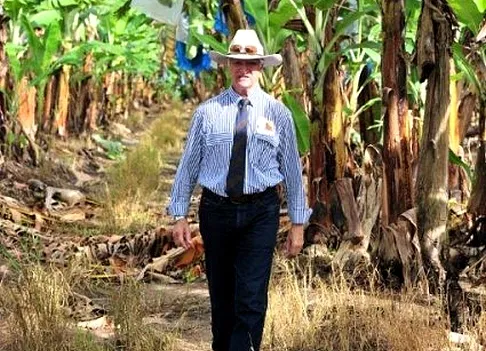A North Queensland Federal Member of Parliament is concerned that a critical proportion of Australia’s fresh produce supply is at risk unless due to a shortage of fruit picking jobs in his region.
Independent Kennedy MP, Bob Katter says his office has been contacted by concerned farmers and representatives of the banana industry who say they will not be able to find an adequate workforce with the national borders closed to backpackers, who fill 60 per cent of fruit picking roles. He is urging locals who have lost their jobs due to the fallout of the COVID-19 pandemic to consider helping out the horticulture industry.
“10 or 20 per cent of Australia’s fruit and vegetable production is at risk - it’s a real possibility,” Mr Katter said. “I’m sorry but everyone has to put their shoulder to the wheel. Two or three months of picking work won’t hurt anyone and in fact, the exercise will do them a lot of good. The newspapers say unemployment will reach 23,000 people in Cairns and a similar number in Townsville. Well, there’s the answer to the farmers’ concerns. You can’t expect people to pay you when you refuse to do any work. That’s not fair."

Mr Katter has also written to the federal government asking them to extend the visas of backpackers who are currently working on North Queensland farms. Those calls have been echoed by the National Farmers’ Federation (NFF) Horticulture Council and the Australian Fresh Produce Alliance (AFPA).
“Horticulture growers across the country employ local and overseas workers and require certainty around visa arrangements to know if their business can continue,” NFF President Fiona Simson said. “Fruit and vegetables are perishable products and must be picked pending seasonal conditions and this means it’s crucial that growers have access to a sufficient labour pool. We are asking the Government to allow foreign workers currently employed in horticulture to continue to work even if their visa is coming to an end. We also need assurances that businesses can move harvest labour from one location to another, including interstate, in a safe and practical way that helps prevent the spread of COVID-19.”
However, not all growers are experiencing a shortage, with the Queensland Horticulture Council reporting some are being overwhelmed by the number of travellers appearing on their front step looking for work. Chair, Joe Moro says the state's horticulture industry is urging employers and job seekers alike to do their homework and put recruitment and travel plans in place early.
“Finding the right people, in the right place and at the right time has always proven problematic for horticulture, and Coronavirus has only magnified this challenge,” he said. “In many cases, these growers already have a full complement of staff and so are having to turn everyone away. This has reportedly led to increased numbers of travellers milling around regional towns. This is exactly what we need to avoid."
The Horticulture Council is encouraging growers to consider their workforce needs now, advertise jobs early, and wherever they can, post their vacancies on the Harvest Trail jobs board here.
The peak body for horticulture in Queensland, Growcom, says growers also have an important role in ensuring governments have the right plans and measures in place at regional and state level to manage the coronavirus contagion.
“We are strongly encouraging Queensland growers to tell Growcom and the State Government about their labour needs over each of the next six months, and have launched an online survey for this purpose," CEO of Growcom, David Thomson said. “This labour forecast data is critical, not just for managing the movement of workers, but for getting regional health services prepared for increased demand as workers migrate around Queensland as produce comes into season. Right now, residents of the regional towns that support our industry are concerned about the capacity of their local health facilities to handle the coronavirus caseload during peak harvest season. As an industry, we owe it to our health professionals to give them as much warning as possible about the likely future shape and size of our workforce."
Meanwhile, the NFF has welcomed new exemptions for roadhouses, that allow truck drivers, including those in the fruit and vegetable supply chain, to continue their work safely.
The National Cabinet made the new provisions, after concerns that roadhouses were shutting their doors to comply with COVID-19 mitigation requirements, impacting truck drivers who needed to manage fatigue. The exemption will ensure that truck drivers can continue to rest, eat, shower, use restrooms and refuel before getting back on the road.
“Truck drivers are, as always, delivering food and other essential items to all Australians,” Ms Simson said. “We welcome the common-sense decision by the National Cabinet in the interests of the safety of our drivers to mandate that roadhouses, dedicated truck stop facilities and truck driver lounges can remain open. The decision also speaks to agriculture and the food supply chain’s status of being an essential service in the nation’s response to COVID-19 crisis.”
